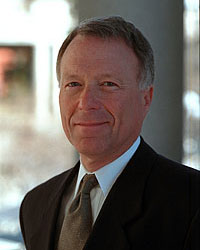Let's Put the "Off the Record Club" On the Record [1]
Submitted by Sheldon Rampton [2] on
 One of the most interesting things about the perjury trial of former White House aide Scooter Libby [3] has been the light it shines on the usually-hidden relationship between top government officials and Washington journalists.
One of the most interesting things about the perjury trial of former White House aide Scooter Libby [3] has been the light it shines on the usually-hidden relationship between top government officials and Washington journalists.
The latest revelation came in testimony by nationally-syndicated columnist Robert Novak [4] about his all-too-cozy relationship with Richard Hohlt [5] — someone who epitomizes the Washington insider. You've probably never heard his name. (Newsweek reporter Michael Isikoff [6] called him a "mystery man [7]" in his report on Novak's testimony.) Yet Hohlt is a major Washington lobbyist, representing clients like Chevron [8], JPMorgan Chase [9] and the Nuclear Energy Institute [10]. He's also a major fundraiser for the Republican Party [11], raking in more than $500,000 to support President Bush's campaign for re-election. He gets together once a month with a group of other GOP heavy hitters in what they call the "Off the Record Club." And, it turns out, Hohlt is also a regular source for the information that appears in Novak's column — so regular, in fact, that it might be more accurate to simply say that Novak is Hohlt's scribe. Hohlt served as a go-between linking Novak to White House Special Advisor Karl Rove [12] as Novak wrote his now-infamous column outing Joseph Wilson [13]'s wife, Valerie Plame [14], as a CIA agent.
"After Novak first told Hohlt that he was working on a hot story about ex-ambassador Joe Wilson," Isikoff reports, "Hohlt says he e-mailed Rove to expect a phone call from Novak. Then Hohlt began pressing Novak to learn the juicy details. On July 11, 2003, three days before the column was published, Novak gave him a preview copy. ... That same day, Hohlt e-mailed details about the column to Rove, and later faxed him the entire unpublished article."
This sordid tale demonstrates how thoroughly inverted reality has become in Washington, for journalists and public officials alike. The very name of Hohlt's "Off the Record Club" phrase makes a mockery of journalism. Reporters can and sometimes must get their information from anonymous sources who speak off the record. A core tenet of journalism is that reporters protect their sources so they can better serve the public’s right to know the truth. They must talk to anonymous sources, the tenet holds, so that they can unearth facts from whistleblowers and other people who might otherwise fear retaliation from the powerful for speaking out.
In the case of Novak and Hohlt, however, the formula was inverted. Novak's sources were the powerful, using anonymity to shield their identities so they could deceive the public and punish a whistleblower. At what point does a reporter cease to be an independent journalist and become instead a covert agent for the government itself and a purveyor of government propaganda? Novak may have crossed that line, and as the Scooter Libby trial demonstrates, he was not the only one.
The best way to fix this system of secrecy and corruption is to expose it. The inbred game of cronyism and collaboration that journalists play with their official sources can only continue as long as it remains hidden. That's why it's time to put the "Off the Record Club" on the record.
